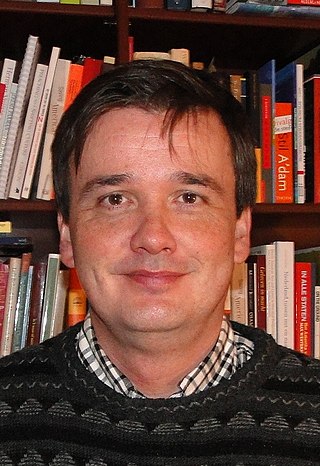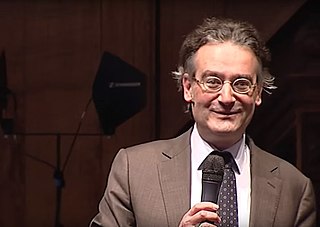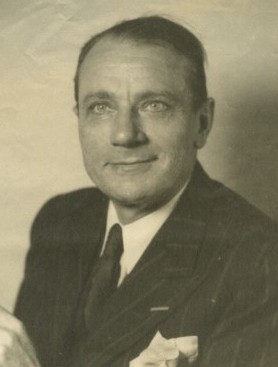
Johan Hendrik Caspar Kern was a Dutch linguist and Orientalist. In the literature, he is usually referred to as H. Kern or Hendrik Kern; a few other scholars bear the same surname.

James Carleton Kennedy is an American historian. He is the son of E.W. (Bill) and Nella Kennedy. The elder Dr. Kennedy was for years an eminent professor of religion at Northwestern College (Iowa).

Geldolph Adriaan "Dolf" Kessler was a Dutch footballer and industrialist. Kessler – along with brother Boeli and cousins Tonny and Dé – played club football for amateur side HVV Den Haag. Kessler also won three caps for the Dutch national side between 1905 and 1906.

Harry Lintsen is a Dutch scientist. He is professor in history of technology at Eindhoven University of Technology, Netherlands, and researcher on microplastics.

Arie Theodorus van Deursen was a Dutch historian whose focus was the early modern period. He was Professor Emeritus of History at the Vrije Universiteit in Amsterdam. He was a specialist in Dutch history of the 16th and 17th century.
Jean Baptiste August "Guus" Kessler Jr. was a Dutch industrialist. Kessler also played tennis for the Netherlands in the 1906 Olympics in Athens, losing his first match to future Olympic champion Max Decugis.
Jacobus Ruurd "Jaap" Bruijn, was one of the best known and respected Dutch maritime historians. He was professor of maritime history at the University of Leiden from 1979 until his retirement in 2003. During his 41-year teaching career as The Netherlands' only university professor of maritime history, he guided the doctoral theses of no fewer than 49 graduate students.
Johan Engelbert Elias was a Dutch historian known mostly for his important work on the history of Amsterdam's regency.

Adriaen Verwer was a Dutch Mennonite merchant, scholar, philosopher and linguist. He wrote books on language, religion and maritime law. He is best known for his grammar Linguae Belgicae, published anonymously in 1707. He is often regarded as the linguistic mentor of his younger friend Lambert ten Kate.

Adriaan Kluit was a Dutch scholar, important in Dutch linguistics. He was born in Dordrecht. He was rector of the Latin school in Alkmaar and Middelburg. In 1779 he became the professor of history at the University of Leiden, remaining there until his death.

Jacobus Franciscus (J.F.) Haccoû was a Dutch economist, Professor of Business Economics at the University of Amsterdam and first director of SEO Economic Research, known for his work on the futures exchange of goods and the economic situation in Dutch East Indies.

Meindert Fennema is a Dutch political scientist and Emeritus Professor of political science, who was attached to the Department of Political Science and the Institute for Migration and Ethnic Studies of the University of Amsterdam, where he held the chair on Political Theory of Ethnic Relations.
Remieg A. M. Aerts is a Dutch historian and Professor of Dutch History at University of Amsterdam.
GITP is a HRD consultancy firm, founded in 1947 in collaboration with the Nijmegen University and the Tilburg School of Economics (Netherlands). Founders were Professor Dr. Theo Rutten and Professor Jan de Quay. Their objective was to contribute to economic restructuring of the Netherlands after World War II employing the most modern scientific insights, based on the philosophy that the right man or woman must be at the right job. A key contribution to achieve this came from the Marshall Plan, which provided funds.

Balthassar Jozef Paul "Bas" van Bavel is a Dutch historian. He has held the chair of Transitions of Economy and Society at Utrecht University since 2011, and has been professor of Economic and Social History since 2007. His research has mostly focused on pre-industrial Northwestern Europe. He was one of the winners of the 2019 Spinoza Prize, the highest award in Dutch science.

George Antoon Philip Weijer (1891-1979) was a business representative in colonial Indonesia, an economics professor at the University of Utrecht, and a government advisor and company director in the Netherlands.
Johan Willem Friso Wielenga is a Dutch contemporary historian.
Max Reisel was a Dutch semiticist and a teacher at the Montessori Lyceum Rotterdam. He strove in the dissemination of knowledge about Judaism in general and Hebrew language in particular. He played an important role in the field of education in the Netherlands.

Arie Abraham (Ary) Kampman was a Dutch scholar of Ancient Near Eastern studies, an initiator of scholarly societies and journals, and a secondary school teacher. Kampman obtained his Dutch PhD degree with professor Frans de Liagre Böhl on the 1945 thesis De historische beteekenis der Hethietische vestingbouwkunde. In 1939 he was a founder of the Nederlands Archaeologisch Instituut voor het Nabije Oosten, the predecessor of the present The Netherlands Institute for the Near East.

Jean Deutz was a Dutch merchant, banker and financier of his brother-in-law Grand pensionary Johan de Witt.













